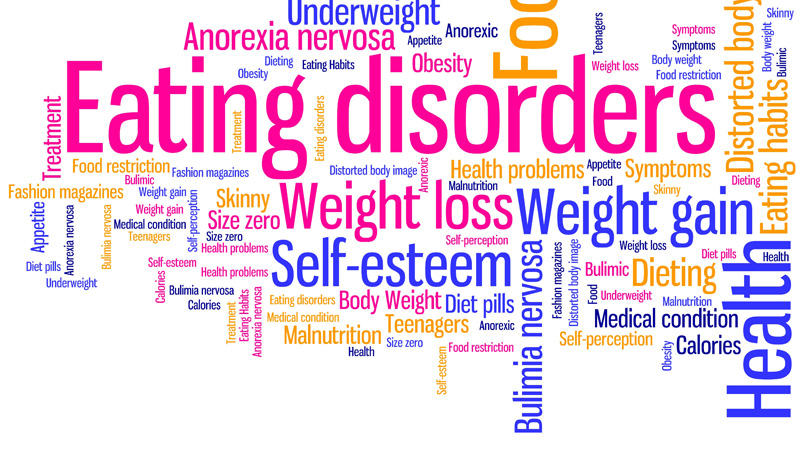Home > Mental Health > Eating Disorders
EATING DISORDERS, SIGNS AND SYMPTOMS
Unfortunately there are a number of different types of eating disorders that plague the youth of America.
 The exact cause of an eating disorder remains unknown. Research indicates, however that the development of an eating disorder could be due to a combination of various behavioral, biological, and social factors. Signs that can indicate the presence of an eating disorder can include rapid weight fluctuations, excessive physical activity, drastic changes in physical shape, peculiar behaviors around food, clear feelings of discontent with body shape and size. Four types of eating disorders that are common amongst teenagers are anorexia nervosa, bulimia nervosa, binge eating disorder, and body dysmorphic disorder. The internal and external pressures that a young person endures throughout adolescence are vast and many of the warning signs related to eating disorders may present themselves at various times. Independently, some of the signs may seem insignificant, but it is essential to be cautious. If there is any concern that your teen may be struggling with an eating disorder, it is best get help.
The exact cause of an eating disorder remains unknown. Research indicates, however that the development of an eating disorder could be due to a combination of various behavioral, biological, and social factors. Signs that can indicate the presence of an eating disorder can include rapid weight fluctuations, excessive physical activity, drastic changes in physical shape, peculiar behaviors around food, clear feelings of discontent with body shape and size. Four types of eating disorders that are common amongst teenagers are anorexia nervosa, bulimia nervosa, binge eating disorder, and body dysmorphic disorder. The internal and external pressures that a young person endures throughout adolescence are vast and many of the warning signs related to eating disorders may present themselves at various times. Independently, some of the signs may seem insignificant, but it is essential to be cautious. If there is any concern that your teen may be struggling with an eating disorder, it is best get help.
ANOREXIA NERVOSA
Anorexia nervosa (anorexia) is when an adolescent imposes self-starvation. A teenager with anorexia will have a distorted body image that will result in an irrational fear of weight gain along with unhealthy eating patterns. It is not uncommon for some teenagers to go through phases of restricting their food intake (in the form of a diet) to control one’s weight, which is not considered anorexia. Anorexia is when a teenager uses his or her relationship with food in a misguided attempt to gain control over his or her emotions. The severe malnutrition that accompanies anorexia can lead to a plethora of health complications, and in some cases, anorexia can be life threatening.
BULIMIA NERVOSA
Bulimia nervosa, (bulimia), occurs when a young person engages in a binge-purge cycle. Meaning that an adolescent has episodes of uncontrolled binging (excessive overeating), followed by purging (removing the food from one’s body). Purging can happen by way of vomiting, abuse of laxatives, over exercising…etc. One of the concerning aspects of bulimia is that many teenagers are able to maintain a healthy body weight, which can cause a teenager’s bulimia to go unnoticed. Young people that struggle with bulimia may engage in a binge-purge cycle as frequently as multiple times a day, or only twice a week. In order to be diagnosed with bulimia, an adolescent must exhibit the binge-purge behavior at least once a week for a minimum of three months.
BINGE EATING DISORDER
Binge eating disorder (BED) occurs when an adolescent eats an unreasonably excessive amount of food in one sitting. In order to be diagnosed with BED a young person must exhibit this behavior at least once a week for a minimum of three months. Binge eating disorder does not allow for a teen to stop eating regardless of how full he or she may be, as it is a psychological disorder. The lack of control over one’s food intake that manifests as BED can cause significant damage in a teen’s life. One physical result of binge eating disorder is that of obesity, because there is no purging component to BED. This physical shift of a sizeable weight gain, in many cases, can perpetuate the behavior of binging.
BODY DYSMORPHIC DISORDER
Body dysmorphic disorder (BDD) is a psychological disorder that manifests as a skewed visual perception of one’s own body. A young person with BDD will believe that his or her body has physical flaws or defects, when in reality it does not. The teen will then become preoccupied and obsessed over the inaccurate flaws creating an inability for the young person to function properly in his or her daily life. The effects of body dysmorphic disorder can have grave consequences and if not treated can result in long-term damage to an adolescent’s self-esteem, social skills, school performance, and physical health.
 Further Information
Further Information
Seeking help is never easy, but you are not alone! If you or someone you know is in need of mental health treatment, we strongly encourage you to reach out for help as quickly as possible. It is not uncommon for many mental health difficulties to impact a person’s life, long term. Seeking support at the beginning of one’s journey can put the individual in the best position to learn how to manage themselves in a healthy way so they can go on to live happy and fulfilling lives.
Our knowledgeable admissions team can be reached 24/7 at info@pacificrtc.com or call: (800) 531-5769
We are available to answer any questions you may have regarding mental health treatment and our residential program, anytime. Contact us today using the form to the right.


